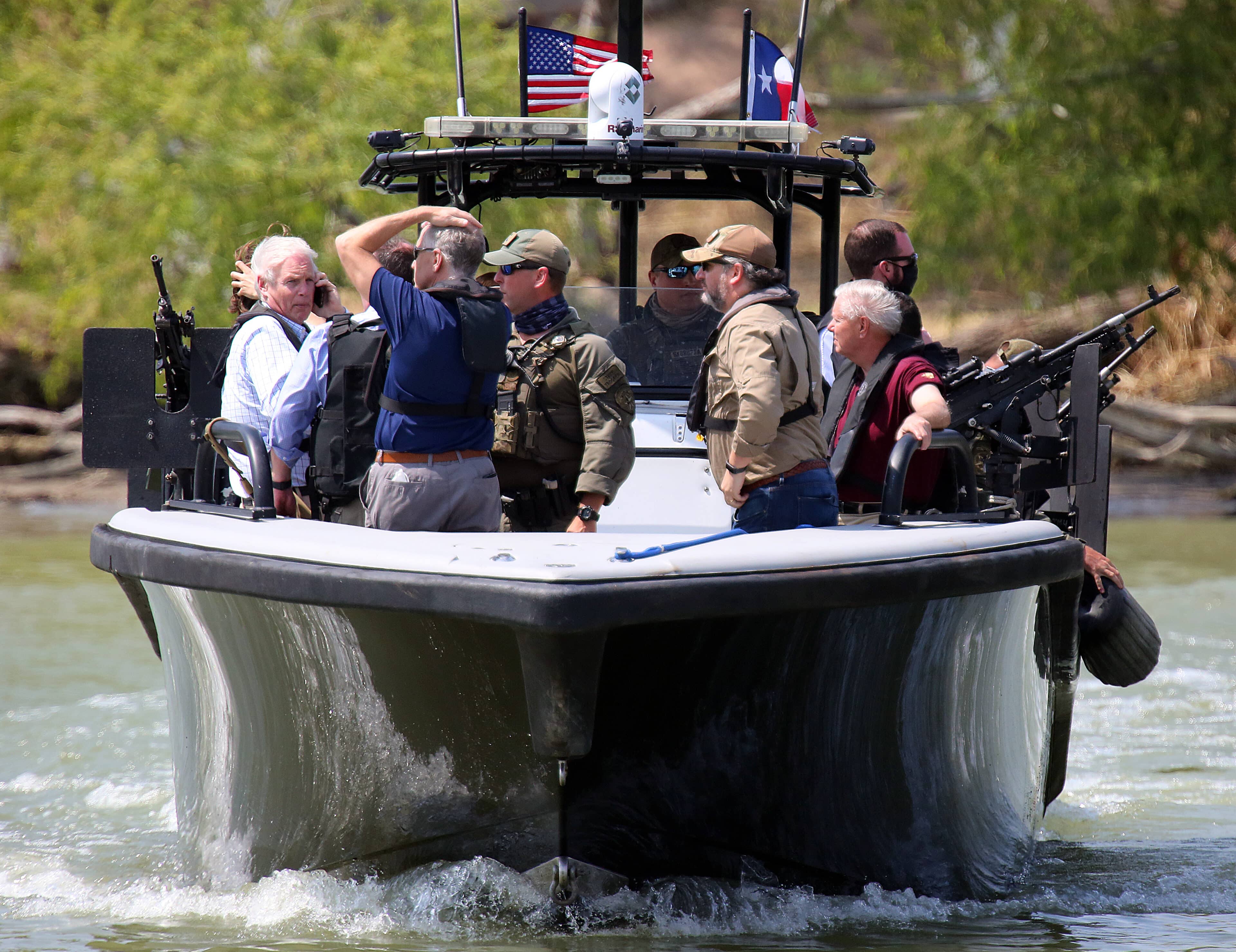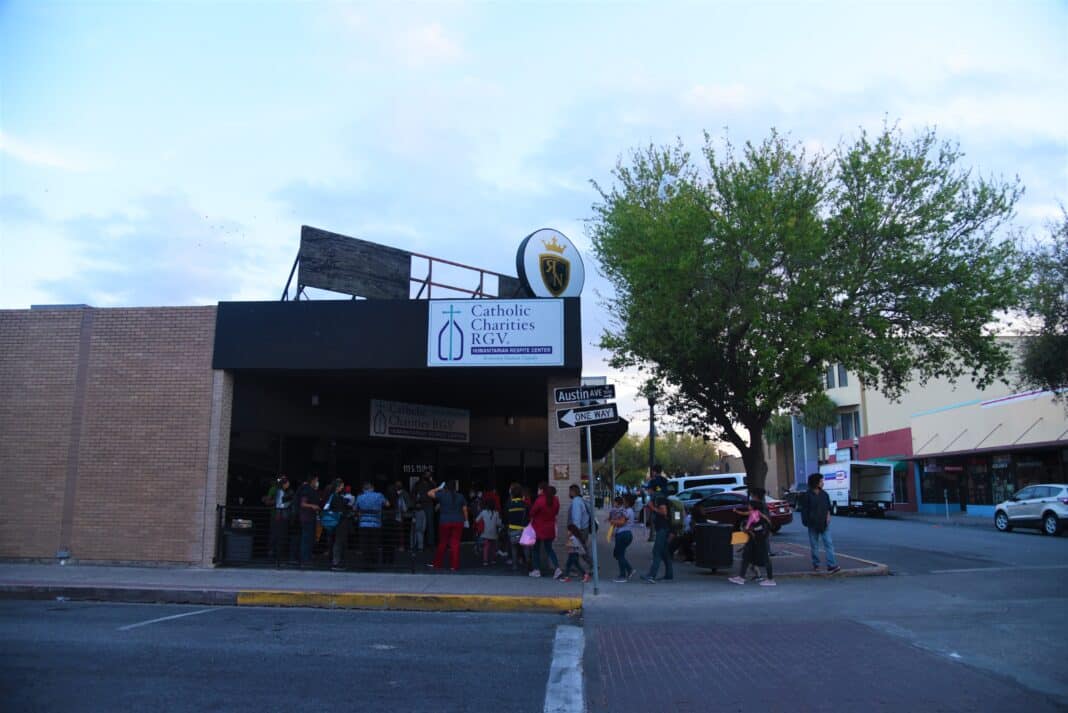It’s happening again.
As thousands of migrants head to the Rio Grande Valley seeking asylum, a long-standing phenomenon in the area, politicians and personalities far and wide visit the border to offer deeply partisan perspectives. Add viral videos that blur truth and opinion, and the South Texas identity has once again fallen prey to a national narrative.
Tuesday was no exception. That’s when one such video was taken in McAllen and shared disinformation, going viral for the discredited but popular InfoWars outlet.
The recording shows two migrant mothers and four children escorted by a volunteer from the Catholic Charities of the Rio Grande Valley respite center into a dented, white SUV parked by the entrance. A team of at least two videographers and three men with InfoWars, including Alex Jones — who’s been banned from Twitter and called “the most prolific conspiracy theorist in contemporary America” by the Southern Poverty Center — descended upon the group.
The children boarded the back of the SUV and did not appear to be properly restrained with seat belts or car seats, an admission Catholic Charities of the Rio Grande Valley made later.
“If you get into a traffic accident, those kids are going to get hurt. How is this Christian?” one of the men with Alex Jones asked the driver as he went inside the SUV.
“You’re violating Texas law,” Jones yelled as he approached the volunteer. While one man asked for the driver’s identity, Jones simultaneously yelled at him as he stood in front of the vehicle blocking it from driving forward.
“You got those smuggled children there illegally,” Jones yelled multiple times in his trademark frenzied tone as he pointed at the driver. The driver attempted to explain he was taking the families to get tested for COVID-19, but one of the InfoWars men didn’t believe him and claimed the migrants were already tested.
McAllen police officers were called.
“Your human smuggling is going to stop, freak,” Jones said, accusing the driver of a state and federal crime. After some time, the migrant families got out of the vehicle and went back to the respite center.
Sister Norma Pimentel, executive director of Catholic Charities of the Rio Grande Valley, called the incident a “staged confrontation,” in a news release shared the following day.
The nonprofit organization refuted the unfounded claims of human smuggling.
Federal and state laws condemn the actions of those who help unauthorized migrants move through the country circumventing law enforcement.
However, migrants seeking asylum who are released from federal custody and are not considered to be “illegally” present in the country, as Jones falsely declared. Those released in the Valley are screened at the U.S. Border Patrol station, including the collection of biographical and biometric information and criminal and national security records checks, Border Patrol officials have previously explained.
“I want to express my deep concern and disappointment regarding this attempt to sensationalize the work of Catholic Charities of the Rio Grande Valley and so many in the city of McAllen who have consistently worked together to provide humanitarian assistance to the most vulnerable,” Pimentel said.
Jones’ visit is one of many in recent weeks, including those from state and federal lawmakers.
Gov. Greg Abbott visited to announce the creation of Operation Lonestar that enhances the presence of Department of Public Safety troopers in South Texas.
Delegations from both sides of the political aisle visited as recently as last week. Republicans and Democratic elected officials are critical of the president’s migration influx management, though each view the issue through the color of their political affiliations.
For locals who work helping immigrants in the Valley, like Rogelio Nuñez, cyclical immigration waves followed by visiting politicians and national media turn a sensitive matter into a spectator atmosphere.
“I always compare it to like going to the zoo. ‘Let’s go down there and look at those exotic animals and see what they’re all about,’” Nuñez said.

Along with an influx of migrants, delegations and media, Nuñez said law enforcement presence tends to follow.
“One of the reasons I think that they come down here is to also let us know what our place is,” Nuñez said. “‘How do we let you know what your place is? Well, we’re going to secure that border.’”
The efforts were replicated by many of the recent lawmakers.
“Perry did it. Bush did it. Abbott’s done it,” Nuñez said, listing recent Texas governors. But, the efforts to secure the border go as far back as the 1920s when 20,000 US Army soldiers were sent to the Mexican border.
Nuñez is a long-standing community advocate for immigrants and a historian. Through Casa de Proyecto Libertad, which is based in Harlingen, he helps immigrant women facing domestic violence come forward to apply for protection. He’s also a keeper of the Valley’s cultural identity.
“It also has its identity, and I will throw this out because I also work with the Narciso Martinez Cultural Arts Center, it did create its own music. It’s called Conjunto music, which is not from Mexico,” said Nuñez, who’s one of the co-founders of the Narciso Martinez Cultural Arts Center in Cameron County.
The distinct sounds that features accordions and the ‘bajo-sexto’ make it a unique sound for the Valley that is as much part of the region as its ranching and agricultural history.
“In the 60s during the Chicano movement, we created our own major cultural renaissance, we created our own poetry. We created our own artwork,” Nuñez added. “We created our ways of thinking and doing that distinguishes us from the rest of the country in terms of who we are.”
“We’re not all the same thinkers,” Nuñez continued.
His father was ardently against Mexican migration, but he hopes those who start a conversation about the Rio Grande Valley’s identity take its rich culture and history into consideration.
“We’re still being looked at as we were looked at years ago,” Nuñez said. “While we’re growing and doing and creating all kinds of things here in the Valley as people from the Valley, the outside world doesn’t see us that way.”





